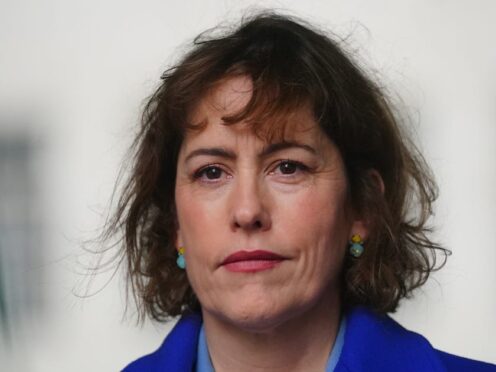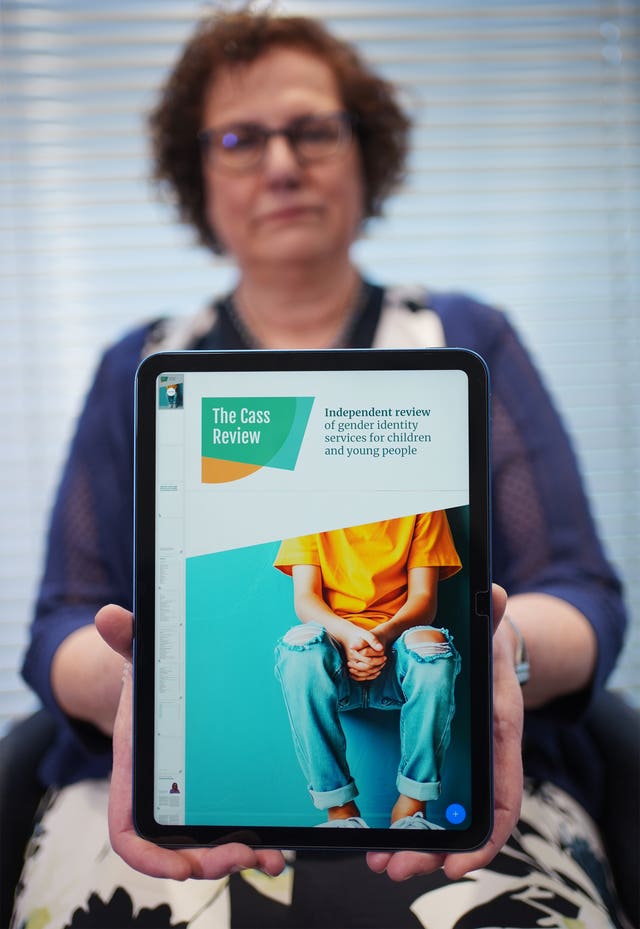
NHS England must end the “culture of secrecy and ideology over evidence and safety”, and make changes to children’s gender care swiftly, Health Secretary Victoria Atkins has said.
The Cass Review published earlier this week said children have been let down by a lack of research and evidence on the use of puberty blockers and hormones.
In a letter to NHS England’s chief executive, Ms Atkins said there can be “no further delay” on understanding the experience of 9,000 young patients of the now-shut gender service at Tavistock trust.
Several gender dysphoria clinics to which Tavistock patients moved refused to take part in a study on the outcomes of the patients, which Ms Atkins described as “disgraceful”.
NHS England has written to the the hospital trusts demanding the data is handed over and it has instructed an end to appointments for under-18s.
It comes as Labour’s shadow health minister, Wes Streeting, called the review’s findings “scandalous” and said he was angry that some clinics had refused to take part in research.
Mr Streeting also told The Sun that he had reflected on his previous view that trans women are women, adding he now recognised the “complexities”.
The report by Dr Hilary Cass, first commissioned in 2020, concluded that gender care is currently an area of “remarkably weak evidence” and young people have been caught up in a “stormy social discourse”.
Research by the University of York, carried out alongside the report, found evidence to be severely lacking on the impact of puberty blockers and hormone treatments, while the majority of clinical guidelines were found not to have followed international standards.
Prime Minister Rishi Sunak has said the findings “shine a spotlight” on the need to “exercise extreme caution” when it comes to gender care for children.
We should be caring and careful in the support given to children and young people who are questioning their gender.
I am very grateful to Dr Cass for today's thorough and thoughtful report.https://t.co/CWHWOdgA7r
[1/3]
— Victoria Atkins (@VictoriaAtkins) April 10, 2024
Writing in the Telegraph, Ms Atkins said: “I am hugely grateful to Dr Cass’s dedicated team for their detailed and considered work on such a contentious area of healthcare.
“I commend those brave voices who spoke up to raise the alarm about how treatment was diverging so far from guidance.
“A culture of secrecy and ideology over evidence and safety. Today I’m saying ‘enough’.
“We simply do not know the lifelong impact of these medical interventions on young minds and bodies to be clear that they are safe.”
She added: “It is disgraceful that adult gender clinics have not co-operated with the vital University of York research to link data on children at the Tavistock so that we can understand their journey into adulthood.
“This Government took the unprecedented step of changing the law to make this possible. There can be no further delay on their full participation.

“I know that NHS England will use all the powers at their disposal to compel this if they have to. Nothing less than full co-operation by those clinics in the research is acceptable.”
With the publication of the review, it emerged that adult clinics had refused to support a study on outcomes for approximately 9,000 young people who have moved over the years from the now-shut gender service at the Tavistock trust into adult gender dysphoria clinics.
Dr Cass said it would have been a “world-leading opportunity” to add to the evidence base and described it as “hugely disappointing” that they had decided not to take part.
Six of the seven adult clinics declined to support the study, with reasons for not doing so including ethical considerations and concerns about funder motivation and political interference.
Ms Atkins said she expects full participation from public and private healthcare, and she is looking to block doctors working abroad from prescribing puberty blockers to children in Britain.
Speaking to The Sun’s Never Mind the Ballots show about the Cass Review, Mr Streeting said: “I think she’s (Dr Cass) done a really important piece of work but I think it does raise some serious concerns that are pretty scandalous.”
Asked if trans women are women, he replied: “No, it’s to the extent that, and I say this with some self criticism and reflection, if you’d asked me a few years ago, on this topic, I would have said trans men are men, trans women are women. Some people are trans: get over it. Let’s move on. This is all blown out of proportion.
“And now I sort of sit and reflect and think actually, there are lots of complexities.”
Mr Streeting said a Labour government would take an “evidence-led approach to this” area of healthcare in future.
But Labour MP Rosie Duffield, writing on X, formerly Twitter, accused male leaders of taking “applause, praise and credit for simply listening to an expert”.
Ms Duffield, who has previously compared being in the party to an “abusive relationship” because of her stance on trans issues, said many women had been “blanked, sidelined, dismissed by male leaders when speaking up and exposing this for years”.
The recommendations in the lengthy and long-awaited report have prompted NHS England, which had already stopped puberty blockers being given to under-16s, to announce a review into the use of hormones.
It has also written to local NHS leaders to ask that they pause first appointment offers at adult gender clinics to young people before their 18th birthday, as it also intends to carry out a major review of these services.
Among her 32 recommendations, Dr Cass called for a “follow-through” service for 17 to 25-year-olds rather than this “vulnerable” group going straight into adult clinics, saying teenagers are “falling off a cliff edge” in their care when they reach 17.
Her report said gender services should operate “to the same standards” as other health services for children and young people, with “a holistic assessment” of referrals, including screening for neurodevelopmental conditions such as autism, and a mental health assessment.

Enjoy the convenience of having The Sunday Post delivered as a digital ePaper straight to your smartphone, tablet or computer.
Subscribe for only £5.49 a month and enjoy all the benefits of the printed paper as a digital replica.
Subscribe